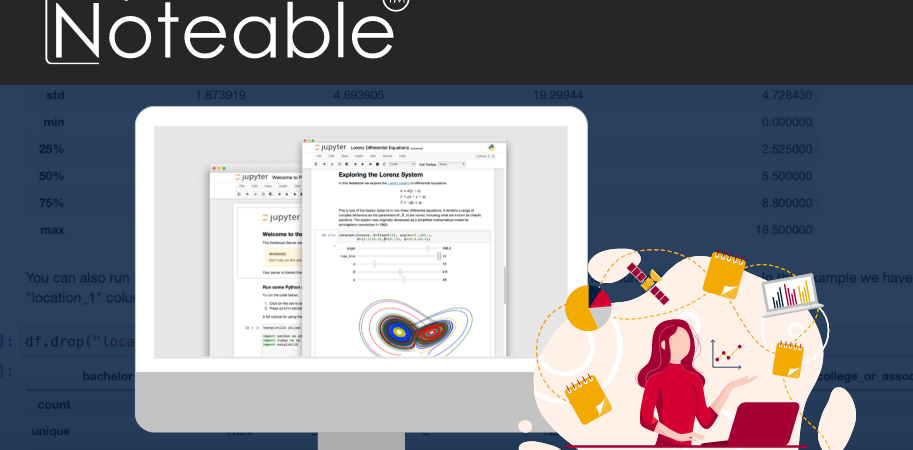
In this post, James Stix discusses his Learning and Teaching Conference poster on Noteable and nbgrader, which illustrates how technology can improve assessment practices in coding-based courses. James is the Service Manager for the online education platform for coding, Noteable, at EDINA in the Centre for Digital Expertise. This post is part of the ‘Transformative Assessment and Feedback’ Learning and Teaching Conference series.
This year’s Learning and Teaching Conference at the University of Edinburgh shone a spotlight on assessment—a concept often regarded with trepidation by both students and staff. Assessments can be high-stakes, fraught with the pressures of grades, deadlines, and the fear of failure. Yet, they are also one of the most crucial elements of the learning journey. The challenge, then, is finding approaches that support students’ progress, build confidence, and offer equitable opportunities for success.
An inclusive assessment strategy seeks to accommodate the diverse backgrounds, abilities, and learning styles of students. Not all learners come to the university with the same preparation or resources, making it essential to consider multiple ways for them to demonstrate their knowledge. One-size-fits-all examinations, for instance, might disadvantage those who struggle with time constraints or high-pressure environments. Alternatively, continuous assessments, portfolios, and project-based tasks can offer more balanced formats that reduce test anxiety and allow students to showcase the depth and range of their skills.
There is also a growing emphasis on feedback as a learning tool rather than merely a grading mechanism. Timely, specific, and constructive feedback is proven to boost motivation and guide students in their academic and personal growth. If students understand where they went wrong and how to improve, they are more likely to stay engaged and view assessments not as punitive hurdles but as meaningful checkpoints for growth.
For many students, the word “assessment” conjures visions of silent exam halls and furrowed brows. However, teaching and learning researchers suggest that the best assessments are often those where students feel less like they are being tested and more like they are being encouraged to explore, experiment, and learn. Class activities that integrate real-world tasks, collaborative projects, or practical simulations highlight the relevance of academic content, making evaluations feel more authentic.
When students see a clear connection between assessments and the practical skills they will use in their future careers, the anxiety surrounding marks can diminish. Authentic assessment methods such as problem-solving challenges, group presentations, peer reviews, or iterative design projects all encourage deeper cognitive processing, creativity, and communication skills. Students can develop a sense of ownership and pride in their work, moving beyond rote memorisation to truly engage with the material.
Technologically enhanced assessments can help foster collaboration and streamline the “housekeeping” elements of teaching, but they only make an impact if they are easy to adopt. Complex, buggy, or poorly documented platforms create barriers for both staff and students. The focus should remain on learning, not on battling with convoluted software.
Teaching-centred tools—that is, platforms designed with both educators and learners in mind—must be user-friendly from the moment you log in. They should leave room for creativity, adapt to a variety of subjects, and minimise tedious administrative tasks. A simplified workflow can free up academics to spend more time on designing innovative course materials and less time on fiddly grade-entry processes or troubleshooting student enrollments.
At this year’s conference, EDINA presented a poster on Noteable and nbgrader, illustrating how technology can improve assessment practices in coding-based courses. Noteable is a Jupyter-based platform that allows students to run coding notebooks directly in their web browsers—no complicated setup or installation required. This is a crucial benefit for inclusivity ; students can learn programming without worrying about whether their personal laptops have the right hardware, software versions, or system permissions.
As we move towards a more inclusive, supportive, and dynamic learning environment, the tools we use to assess students should encourage curiosity, collaborative problem-solving, and continuous improvement. By championing technology like Noteable, alongside well-thought-out assessment designs, we can help students feel more engaged, less anxious, and empowered to direct their learning journeys.
The journey does not end here. EDINA is committed to developing further resources, workshops, and tutorials to support staff in integrating Noteable and nbgrader into their teaching. If you want to learn more or share your own ideas, we invite you to join our upcoming training sessions and user community forums. By working together, we can highlight best practices, tackle challenges, and ultimately offer students the high-quality, inclusive education they deserve.
Read James’ other post on the merits of working with Jupyter notebooks for teaching coding.
 James Stix
James Stix
James Stix is the Service Manager for the online education platform for coding, Noteable, at EDINA, the Centre for Digital Expertise at The University of Edinburgh. He is an experienced IT and partnerships manager and is passionate about exploring where technology unlocks human potential towards sustainable futures. He is a strong advocate for its role in augmenting our capabilities rather than replacing them.


